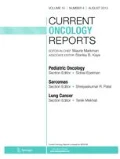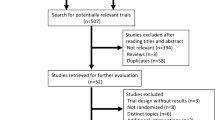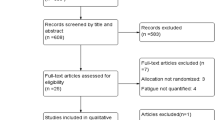Abstract
Purpose of Review
To (1) explain what yoga is, (2) summarize published literature on the efficacy of yoga for managing cancer treatment-related toxicities, (3) provide clinical recommendations on the use of yoga for oncology professionals, and (4) suggest promising areas for future research.
Recent Findings
Based on a total of 24 phase II and one phase III clinical trials, low-intensity forms of yoga, specifically gentle hatha and restorative, are feasible, safe, and effective for treating sleep disruption, cancer-related fatigue, cognitive impairment, psychosocial distress, and musculoskeletal symptoms in cancer patients receiving chemotherapy and radiation and cancer survivors.
Summary
Clinicians should consider prescribing yoga for their patients suffering with these toxicities by referring them to qualified yoga professionals. More definitive phase III clinical trials are needed to confirm these findings and to investigate other types, doses, and delivery modes of yoga for treating cancer-related toxicities in patients and survivors.

Similar content being viewed by others
References
Papers of particular interest, published recently, have been highlighted as: • Of importance
Howlader N NA, Krapcho M, Miller D, Bishop K, Kosary CL, Yu M, Ruhl J, Tatalovich Z, Mariotto A, Lewis DR, Chen HS, Feuer EJ, Cronin KA (eds). SEER Cancer Statistics Review, 1975–2014, National Cancer Institute. Bethesda, MD, https://seer.cancer.gov/csr/1975_2014/, based on November 2016 SEER data submission, posted to the SEER web site, April 2017.
Miller KD, Siegel RL, Lin CC, Mariotto AB, Kramer JL, Rowland JH, et al. Cancer treatment and survivorship statistics, 2016. CA Cancer J Clin. 2016;66(4):271–89. https://doi.org/10.3322/caac.21349.
Minton O, Stone P. How common is fatigue in disease-free breast cancer survivors? A systematic review of the literature. Breast Cancer Res Treat. 2008;112(1):5–13. https://doi.org/10.1007/s10549-007-9831-1.
Prue G, Rankin J, Allen J, Gracey J, Cramp F. Cancer-related fatigue: a critical appraisal. Eur J Cancer. 2006;42(7):846–63. https://doi.org/10.1016/j.ejca.2005.11.026.
Andrykowski MA, Donovan KA, Laronga C, Jacobsen PB. Prevalence, predictors, and characteristics of off-treatment fatigue in breast cancer survivors. Cancer. 2010;116(24):5740–8.
Cella D, Davis K, Breitbart W, Curt G. Cancer-related fatigue: prevalence of proposed diagnostic criteria in a United States sample of cancer survivors. J Clin Oncol. 2001;19(14):3385–91. https://doi.org/10.1200/JCO.2001.19.14.3385.
Servaes P, Verhagen C, Bleijenberg G. Fatigue in cancer patients during and after treatment: prevalence, correlates and interventions. Eur J Cancer. 2002;38(1):27–43. https://doi.org/10.1016/S0959-8049(01)00332-X.
Bower JE, Ganz PA, Desmond KA, Bernaards C, Rowland JH, Meyerowitz BE, et al. Fatigue in long-term breast carcinoma survivors: a longitudinal investigation. Cancer. 2006;106(4):751–8. https://doi.org/10.1002/cncr.21671.
Hofman M, Ryan JL, Figueroa-Moseley CD, Jean-Pierre P, Morrow GR. Cancer-related fatigue: the scale of the problem. Oncologist. 2007;12(Suppl 1):4–10. https://doi.org/10.1634/theoncologist.12-S1-4.
Carpenter JS, Elam JL, Ridner SH, Carney PH, Cherry GJ, Cucullu HL. Sleep, fatigue, and depressive symptoms in breast cancer survivors and matched healthy women experiencing hot flashes. Oncol Nurs Forum. 2004;31(3):591–5598. https://doi.org/10.1188/04.ONF.591-598.
Stepanski EJ, Walker MS, Schwartzberg LS, Blakely LJ, Ong JC, Houts AC. The relation of trouble sleeping, depressed mood, pain, and fatigue in patients with cancer. J Clin Sleep Med. 2009;5(2):132–6.
Roscoe JA, Kaufman ME, Matteson-Rusby SE, Palesh OG, Ryan JL, Kohli S, et al. Cancer-related fatigue and sleep disorders. Oncologist. 2007;12(Suppl 1):35–42. https://doi.org/10.1634/theoncologist.12-S1-35.
Bower JE, Ganz PA, Desmond KA, Rowland JH, Meyerowitz BE, Belin TR. Fatigue in breast cancer survivors: occurrence, correlates, and impact on quality of life. J Clin Oncol. 2000;18(4):743–53. https://doi.org/10.1200/JCO.2000.18.4.743.
Alexander S, Minton O, Andrews P, Stone P. A comparison of the characteristics of disease-free breast cancer survivors with or without cancer-related fatigue syndrome. Eur J Cancer. 2009;45(3):384–92. https://doi.org/10.1016/j.ejca.2008.09.010.
Donovan KA, Jacobsen PB. Fatigue, depression, and insomnia: evidence for a symptom cluster in cancer. Semin Oncol Nurs. 2007;23(2):127–35. https://doi.org/10.1016/j.soncn.2007.01.004.
Beck SL, Dudley WN, Barsevick A. Pain, sleep disturbance, and fatigue in patients with cancer: using a mediation model to test a symptom cluster. Oncol Nurs Forum. 2005;32(3):542. https://doi.org/10.1188/04.ONF.E48-E55.
Kuhnt S, Ernst J, Singer S, Ruffer JU, Kortmann RD, Stolzenburg JU, et al. Fatigue in cancer survivors—prevalence and correlates. Onkologie. 2009;32(6):312–7. https://doi.org/10.1159/000215943.
Curt GA, Breitbart W, Cella D, Groopman JE, Horning SJ, Itri LM, et al. Impact of cancer-related fatigue on the lives of patients: new findings from the Fatigue Coalition. Oncologist. 2000;5(5):353–60. https://doi.org/10.1634/theoncologist.5-5-353.
NCTN disease-specific and symptom management & health related quality of life steering committees. Strategic priorities. 2015;34–8. https://www.cancer.gov/about-nci/organization/ccct/steering-committees/strategic-priorities.pdf.
Bower JE, Woolery A, Sternlieb B, Garet D. Yoga for cancer patients and survivors. Cancer Control. 2005;12(3):165–71. https://doi.org/10.1177/107327480501200304.
Danhauer SC, Mihalko SL, Russell GB, Campbell CR, Felder L, Daley K, et al. Restorative yoga for women with breast cancer: findings from a randomized pilot study. Psycho-Oncology. 2009;18(4):360–8. https://doi.org/10.1002/pon.1503.
Danhauer SC, Tooze JA, Farmer DF, Campbell CR, McQuellon RP, Barrett R, et al. Restorative yoga for women with ovarian or breast cancer: findings from a pilot study. J Soc Integr Oncol. 2008;6(2):47–58.
Elkins G, Fisher W, Johnson A. Mind-body therapies in integrative oncology. Curr Treat Options in Oncol. 2010;11(3–4):128–40. https://doi.org/10.1007/s11864-010-0129-x.
Saper RB, Eisenberg DM, Davis RB, Culpepper L, Phillips RS. Prevalence and patterns of adult yoga use in the United States: results of a national survey. Altern Ther Health Med. 2004;10(2):44–9.
Smith KB, Pukall CF. An evidence-based review of yoga as a complementary intervention for patients with cancer. Psycho-Oncology. 2009;18(5):465–75. https://doi.org/10.1002/pon.1411.
Cohen L, Warneke C, Fouladi RT, Rodriguez MA, Chaoul-Reich A. Psychological adjustment and sleep quality in a randomized trial of the effects of a Tibetan yoga intervention in patients with lymphoma. Cancer. 2004;100(10):2253–60. https://doi.org/10.1002/cncr.20236.
Kirk MBB. Hatha Yoga for greater strength, flexibility, and focus. Champaign: Human Kinetics; 2003.
• Mustian KM, Sprod LK, Janelsins M, Peppone LJ, Palesh OG, Chandwani K, et al. Multicenter, randomized controlled trial of yoga for sleep quality among cancer survivors. J Clin Oncol. 2013;31(26):3233–41.This is the only phase III randomized controlled trial investigating the effects of yoga on sleep quality in cancer survivors. This study is also one of the only studies to use both validated subjective and objective outcome measures of sleep in cancer survivors. After 4 weeks of the YOCAS©® yoga intervention, participants reported greater improvements in sleep quality and their objective actigraphy results corroborated with the subjective outcomes. https://doi.org/10.1200/JCO.2012.43.7707.
Mustian KM, Sprod LK, Palesh OG, Peppone LJ, Janelsins MC, Mohile SG, et al. Exercise for the management of side effects and quality of life among cancer survivors. Curr Sports Med Rep. 2009;8(6):325–30. https://doi.org/10.1249/JSR.0b013e3181c22324.
Mustian KM, Morrow GR, Carroll JK, Figueroa-Moseley CD, Jean-Pierre P, Williams GC. Integrative nonpharmacologic behavioral interventions for the management of cancer-related fatigue. Oncologist. 2007;12(Suppl 1):52–67. https://doi.org/10.1634/theoncologist.12-S1-52.
S M. Hatha yoga pradipika. Poughkeepsie: Nesma Books India; 2000.
J L. Relax and renew restful yoga for stressful times. Berkeley: Publishers Group West; 1995.
Ancoli-Israel S, Liu L, Marler MR, Parker BA, Jones V, Sadler GR, et al. Fatigue, sleep, and circadian rhythms prior to chemotherapy for breast cancer. Support Care Cancer. 2006;14(3):201–9. https://doi.org/10.1007/s00520-005-0861-0.
Berger AM, Farr LA, Kuhn BR, Fischer P, Agrawal S. Values of sleep/wake, activity/rest, circadian rhythms, and fatigue prior to adjuvant breast cancer chemotherapy. J Pain Symptom Manag. 2007;33(4):398–409. https://doi.org/10.1016/j.jpainsymman.2006.09.022.
Berger AM, Grem JL, Visovsky C, Marunda HA, Yurkovich JM. Fatigue and other variables during adjuvant chemotherapy for colon and rectal cancer. Oncol Nurs Forum. 2010;37(6):E359–69. https://doi.org/10.1188/10.ONF.E359-E369.
Palesh OG, Roscoe JA, Mustian KM, Roth T, Savard J, Ancoli-Israel S, et al. Prevalence, demographics, and psychological associations of sleep disruption in patients with cancer: University of Rochester Cancer Center-Community Clinical Oncology Program. J Clin Oncol. 2010;28(2):292–8. https://doi.org/10.1200/JCO.2009.22.5011.
Savard J, Simard S, Blanchet J, Ivers H, Morin CM. Prevalence, clinical characteristics, and risk factors for insomnia in the context of breast cancer. Sleep. 2001;24(5):583–90. https://doi.org/10.1093/sleep/24.5.583.
Schultz PN, Klein MJ, Beck ML, Stava C, Sellin RV. Breast cancer: relationship between menopausal symptoms, physiologic health effects of cancer treatment and physical constraints on quality of life in long-term survivors. J Clin Nurs. 2005;14(2):204–11. https://doi.org/10.1111/j.1365-2702.2004.01030.x.
Bower JE, Garet D, Sternlieb B, Ganz PA, Irwin MR, Olmstead R, et al. Yoga for persistent fatigue in breast cancer survivors: a randomized controlled trial. Cancer. 2012;118(15):3766–75. https://doi.org/10.1002/cncr.26702.
Cadmus-Bertram L, Littman AJ, Ulrich CM, Stovall R, Ceballos RM, McGregor BA, et al. Predictors of adherence to a 26-week viniyoga intervention among post-treatment breast cancer survivors. J Altern Complement Med. 2013;19(9):751–8. https://doi.org/10.1089/acm.2012.0118.
Carson JW, Carson KM, Porter LS, Keefe FJ, Seewaldt VL. Yoga of awareness program for menopausal symptoms in breast cancer survivors: results from a randomized trial. Support Care Cancer. 2009;17(10):1301–9. https://doi.org/10.1007/s00520-009-0587-5.
Chandwani KD, Perkins G, Nagendra HR, Raghuram NV, Spelman A, Nagarathna R, et al. Randomized, controlled trial of yoga in women with breast cancer undergoing radiotherapy. J Clin Oncol. 2014;32(10):1058–65. https://doi.org/10.1200/JCO.2012.48.2752.
Chandwani KD, Thornton B, Perkins GH, Arun B, Raghuram NV, Nagendra HR, et al. Yoga improves quality of life and benefit finding in women undergoing radiotherapy for breast cancer. J Soc Integr Oncol. 2010;8(2):43–55.
Johns SA, Brown LF, Beck-Coon K, Monahan PO, Tong Y, Kroenke K. Randomized controlled pilot study of mindfulness-based stress reduction for persistently fatigued cancer survivors. Psycho-Oncology. 2015;24(8):885–93. https://doi.org/10.1002/pon.3648.
Vadiraja SH, Rao MR, Nagendra RH, Nagarathna R, Rekha M, Vanitha N, et al. Effects of yoga on symptom management in breast cancer patients: a randomized controlled trial. Int J Yoga. 2009;2(2):73–9. https://doi.org/10.4103/0973-6131.60048.
Patrick DL, Ferketich SL, Frame PS, Harris JJ, Hendricks CB, Levin B, et al. National Institutes of Health State-of-the-Science Conference Statement: symptom management in cancer: pain, depression, and fatigue, July 15–17, 2002. J Natl Cancer Inst. 2003;95(15):1110–7.
Henry DH, Viswanathan HN, Elkin EP, Traina S, Wade S, Cella D. Symptoms and treatment burden associated with cancer treatment: results from a cross-sectional national survey in the US. Support Care Cancer. 2008;16(7):791–801. https://doi.org/10.1007/s00520-007-0380-2.
Lawrence DP, Kupelnick B, Miller K, Devine D, Lau J. Evidence report on the occurrence, assessment, and treatment of fatigue in cancer patients. J Natl Cancer Inst Monogr. 2004;32:40–50.
Banasik J, Williams H, Haberman M, Blank SE, Bendel R. Effect of Iyengar yoga practice on fatigue and diurnal salivary cortisol concentration in breast cancer survivors. J Am Acad Nurse Pract. 2011;23(3):135–42. https://doi.org/10.1111/j.1745-7599.2010.00573.x.
• Bower JE, Greendale G, Crosswell AD, Garet D, Sternlieb B, Ganz PA, et al. Yoga reduces inflammatory signaling in fatigued breast cancer survivors: a randomized controlled trial. Psychoneuroendocrinology. 2014;43:20–9. This is one of the very few studies that have examined the effects of yoga on inflammatoryco processes in cancer survivors. Their findings suggested that Iyengar-based, restorative yoga intervention may alter inflmmation-related transcriptional control pathways and further influence behavorial symptoms in cancer population. https://doi.org/10.1016/j.psyneuen.2014.01.019.
Lotzke D, Wiedemann F, Rodrigues Recchia D, Ostermann T, Sattler D, Ettl J, et al. Iyengar-yoga compared to exercise as a therapeutic intervention during (neo)adjuvant therapy in women with stage I-III breast cancer: health-related quality of life, mindfulness, spirituality, life satisfaction, and cancer-related fatigue. Evid Based Complement Alternat Med: eCAM. 2016;2016:5931816.
Sprod LK, Fernandez ID, Janelsins MC, Peppone LJ, Atkins JN, Giguere J, et al. Effects of yoga on cancer-related fatigue and global side-effect burden in older cancer survivors. J Geriatr Oncol. 2015;6(1):8–14. https://doi.org/10.1016/j.jgo.2014.09.184.
Stan DL, Croghan KA, Croghan IT, Jenkins SM, Sutherland SJ, Cheville AL, et al. Randomized pilot trial of yoga versus strengthening exercises in breast cancer survivors with cancer-related fatigue. Support Care Cancer. 2016;24(9):4005–15. https://doi.org/10.1007/s00520-016-3233-z.
Culos-Reed SN, Carlson LE, Daroux LM, Hately-Aldous S. A pilot study of yoga for breast cancer survivors: physical and psychological benefits. Psycho-Oncology. 2006;15(10):891–7. https://doi.org/10.1002/pon.1021.
Littman AJ, Bertram LC, Ceballos R, Ulrich CM, Ramaprasad J, McGregor B, et al. Randomized controlled pilot trial of yoga in overweight and obese breast cancer survivors: effects on quality of life and anthropometric measures. Support Care Cancer. 2012;20(2):267–77. https://doi.org/10.1007/s00520-010-1066-8.
Moadel AB, Shah C, Wylie-Rosett J, Harris MS, Patel SR, Hall CB, et al. Randomized controlled trial of yoga among a multiethnic sample of breast cancer patients: effects on quality of life. J Clin Oncol. 2007;25(28):4387–95. https://doi.org/10.1200/JCO.2006.06.6027.
• Kiecolt-Glaser JK, Bennett JM, Andridge R, Peng J, Shapiro CL, Malarkey WB, et al. Yoga’s impact on inflammation, mood, and fatigue in breast cancer survivors: a randomized controlled trial. J Clin Oncol. 2014;32(10):1040–9. This is the first randomized controlled trial using yoga intervention on breast cancer survivors to show significant inflammatory changes. Three months after a 3-month hatha yoga intervention, fatigue, and pro-inflammatory cytokines (IL-6, IL-1β, TNF -α) were significantly lower for yoga participants compared with the control group. https://doi.org/10.1200/JCO.2013.51.8860.
Janelsins MC, Kesler SR, Ahles TA, Morrow GR. Prevalence, mechanisms, and management of cancer-related cognitive impairment. Int Rev Psychiatry. 2014;26(1):102–13. https://doi.org/10.3109/09540261.2013.864260.
Janelsins MC, Heckler CE, Peppone LJ, Kamen C, Mustian KM, Mohile SG, et al. Cognitive complaints in survivors of breast cancer after chemotherapy compared with age-matched controls: an analysis from a nationwide, multicenter, prospective longitudinal study. J Clin Oncol. 2017;35(5):506–14.
Derry HM, Jaremka LM, Bennett JM, Peng J, Andridge R, Shapiro C, et al. Yoga and self-reported cognitive problems in breast cancer survivors: a randomized controlled trial. Psycho-Oncology. 2015;24(8):958–66. https://doi.org/10.1002/pon.3707.
• Janelsins MC, Peppone LJ, Heckler CE, Kesler SR, Sprod LK, Atkins J, et al. YOCAS©® Yoga reduces self-reported memory difficulty in cancer survivors in a nationwide randomized clinical trial: investigating relationships between memory and sleep. Integr Cancer Ther. 2016;15(3):263–71. This is the first phase III randomized controlled trial suggesting that yoga can improved perceived memory function in cancer survivors. They also found that sleep quality was a partial mediator of memory difficulty in cancer survivors. https://doi.org/10.1177/1534735415617021.
Andrykowski MA, Lykins E, Floyd A. Psychological health in cancer survivors. Semin Oncol Nurs. 2008;24(3):193–201. https://doi.org/10.1016/j.soncn.2008.05.007.
Blank S, Kittel J, Haberman M. Active practice of Iyengar yoga as an intervention for breast cancer survivors. Int J Yoga Ther. 2005;15(1):51–9.
Kovacic T, Kovacic M. Impact of relaxation training according to Yoga In Daily Life® system on perceived stress after breast cancer surgery. Integr Cancer Ther. 2011;10(1):16–26. https://doi.org/10.1177/1534735410387418.
Raghavendra RM, Nagarathna R, Nagendra HR, Gopinath KS, Srinath BS, Ravi BD, et al. Effects of an integrated yoga programme on chemotherapy-induced nausea and emesis in breast cancer patients. Eur J Cancer Care. 2007;16(6):462–74. https://doi.org/10.1111/j.1365-2354.2006.00739.x.
Rao MR, Raghuram N, Nagendra HR, Gopinath KS, Srinath BS, Diwakar RB, et al. Anxiolytic effects of a yoga program in early breast cancer patients undergoing conventional treatment: a randomized controlled trial. Complement Ther Med. 2009;17(1):1–8. https://doi.org/10.1016/j.ctim.2008.05.005.
Vadiraja HS, Raghavendra RM, Nagarathna R, Nagendra HR, Rekha M, Vanitha N, et al. Effects of a yoga program on cortisol rhythm and mood states in early breast cancer patients undergoing adjuvant radiotherapy: a randomized controlled trial. Integr Cancer Ther. 2009;8(1):37–46. https://doi.org/10.1177/1534735409331456.
Vadiraja HS, Rao MR, Nagarathna R, Nagendra HR, Rekha M, Vanitha N, et al. Effects of yoga program on quality of life and affect in early breast cancer patients undergoing adjuvant radiotherapy: a randomized controlled trial. Complement Ther Med. 2009;17(5–6):274–80. https://doi.org/10.1016/j.ctim.2009.06.004.
Cramer H, Pokhrel B, Fester C, Meier B, Gass F, Lauche R, et al. A randomized controlled bicenter trial of yoga for patients with colorectal cancer. Psycho-Oncology. 2016;25(4):412–20. https://doi.org/10.1002/pon.3927.
Yagli NV, Ulger O. The effects of yoga on the quality of life and depression in elderly breast cancer patients. Complement Ther Clin Pract. 2015;21(1):7–10. https://doi.org/10.1016/j.ctcp.2015.01.002.
Banerjee B, Vadiraj HS, Ram A, Rao R, Jayapal M, Gopinath KS, et al. Effects of an integrated yoga program in modulating psychological stress and radiation-induced genotoxic stress in breast cancer patients undergoing radiotherapy. Integr Cancer Ther. 2007;6(3):242–50. https://doi.org/10.1177/1534735407306214.
Peppone LJ, Janelsins MC, Kamen C, Mohile SG, Sprod LK, Gewandter JS, et al. The effect of YOCAS©® yoga for musculoskeletal symptoms among breast cancer survivors on hormonal therapy. Breast Cancer Res Treat. 2015;150(3):597–604. https://doi.org/10.1007/s10549-015-3351-1.
Long Parma D, Hughes DC, Ghosh S, Li R, Trevino-Whitaker RA, Ogden SM, et al. Effects of six months of yoga on inflammatory serum markers prognostic of recurrence risk in breast cancer survivors. SpringerPlus. 2015;4(1):143. https://doi.org/10.1186/s40064-015-0912-z.
Rao RM, Nagendra HR, Raghuram N, Vinay C, Chandrashekara S, Gopinath KS, et al. Influence of yoga on postoperative outcomes and wound healing in early operable breast cancer patients undergoing surgery. Int J Yoga. 2008;1(1):33–41. https://doi.org/10.4103/0973-6131.36795.
Ross A, Thomas S. The health benefits of yoga and exercise: a review of comparison studies. J Altern Complement Med. 2010;16(1):3–12. https://doi.org/10.1089/acm.2009.0044.
Mustian KM, Sprod LK, Janelsins M, Peppone LJ, Mohile S. Exercise recommendations for cancer-related fatigue, cognitive impairment, sleep problems, depression, pain, anxiety, and physical dysfunction: a review. Oncol Hematol Rev. 2012;8(2):81–8. https://doi.org/10.17925/OHR.2012.08.2.81.
Schmitz KH, Courneya KS, Matthews C, Demark-Wahnefried W, Galvao DA, Pinto BM, et al. American College of Sports Medicine roundtable on exercise guidelines for cancer survivors. Med Sci Sports Exerc. 2010;42(7):1409–26. https://doi.org/10.1249/MSS.0b013e3181e0c112.
Funding
NIH/NCI 1R01CA181064, NIH/NCI SUG1CA189961, NIH/NCI UG1CA189961, R25 CA102618B
Author information
Authors and Affiliations
Corresponding author
Ethics declarations
Conflict of Interest
Po-Ju Lin declares that she has no conflict of interest.
Luke J. Peppone declares that he has no conflict of interest.
Michelle C. Janelsins declares that she has no conflict of interest.
Supriya G. Mohile has served as a consultant for Seattle Genetics.
Charles Kamen declares that he has no conflict of interest.
Ian R. Kleckner is supported by a grant from the National Cancer Institute.
Chunkit Fung declares that he has no conflict of interest.
Matthew Asare declares that he has no conflict of interest.
Calvin L. Cole declares that he has no conflict of interest.
Eva Culakova declares that she has no conflict of interest.
Karen M. Mustian declares that she has no conflict of interest.
Human and Animal Rights and Informed Consent
This article does not contain any studies with human or animal subjects performed by any of the authors.
Additional information
This article is part of the Topical Collection on Integrative Care
Rights and permissions
About this article
Cite this article
Lin, PJ., Peppone, L.J., Janelsins, M.C. et al. Yoga for the Management of Cancer Treatment-Related Toxicities. Curr Oncol Rep 20, 5 (2018). https://doi.org/10.1007/s11912-018-0657-2
Published:
DOI: https://doi.org/10.1007/s11912-018-0657-2




